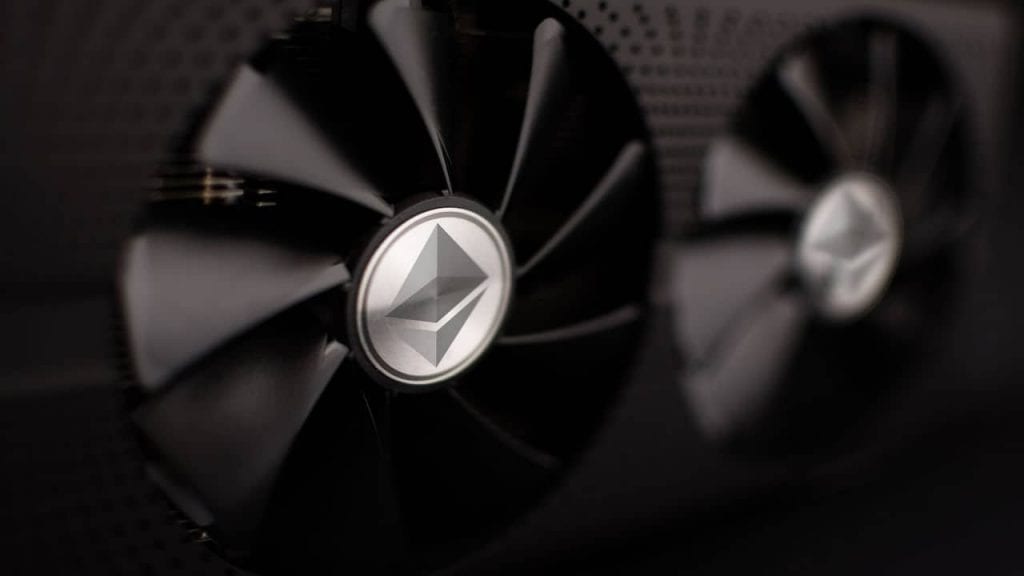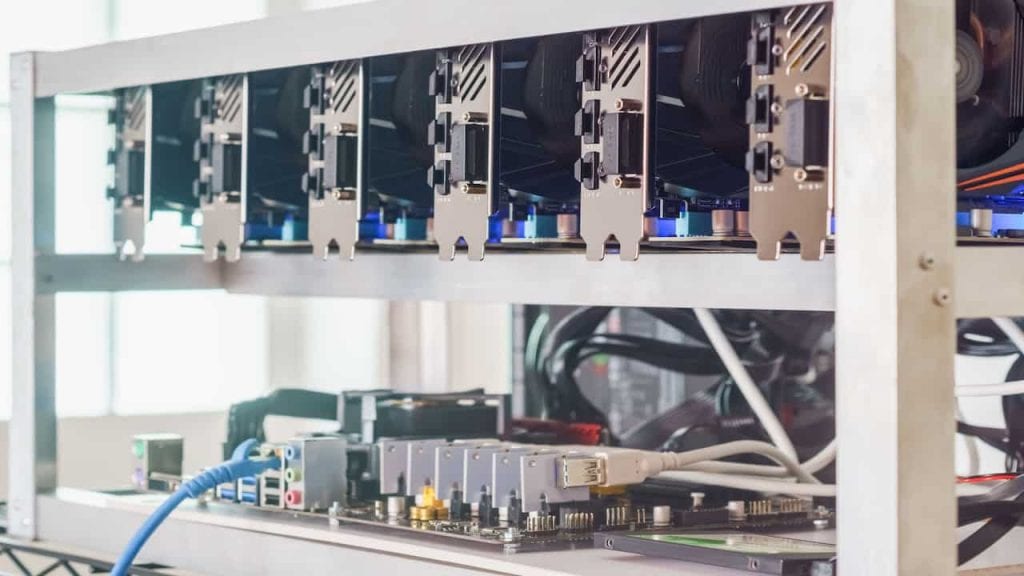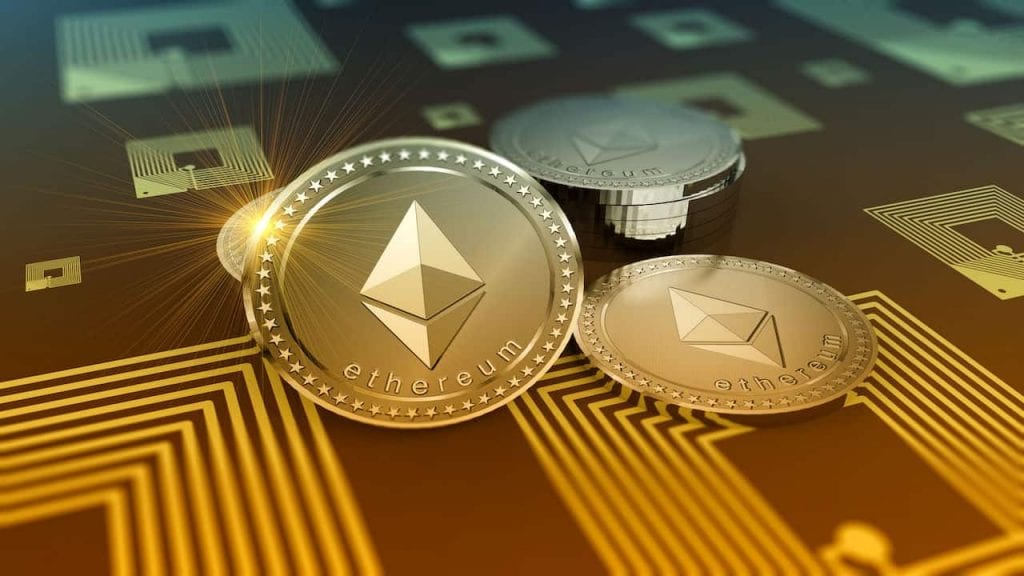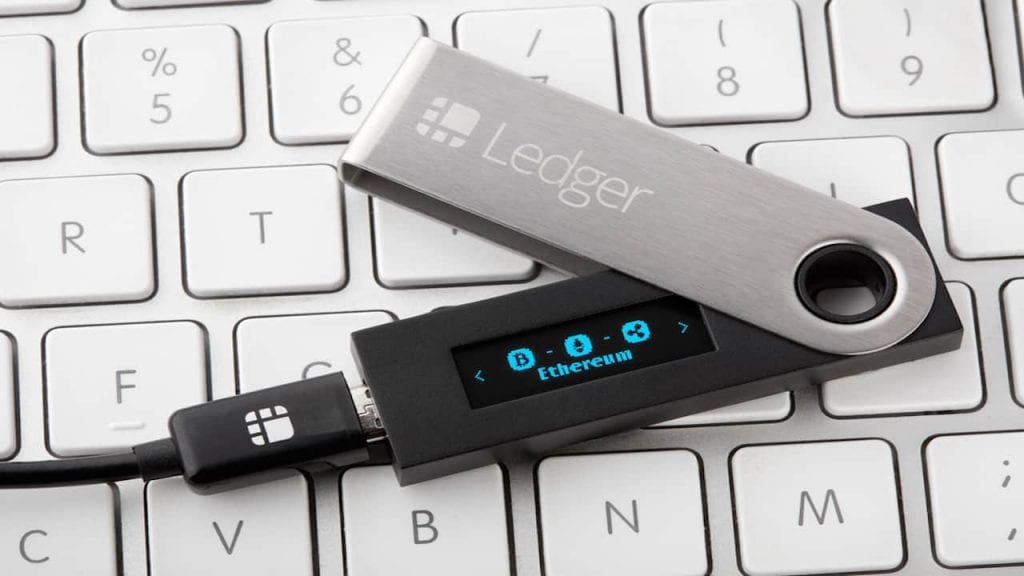Ethereum Mining – how is the cryptocurrency produced?
Mining is an important part of the Ethereum (ETH) network transaction process. Like many other cryptocurrencies, ETH must first be processed before the transactions are realised. By mining Ethereum, miners can earn additional coins — possible either with a conventional PC or via an Ethereum mining pool. Read on as we highlight what makes Ethereum unique and how the mining process actually works.

Content:
- Ethereum – The background of the cryptocurrency
- Ethereum mining – The Ethereum mining rig explained
- Ethereum cloud mining as an alternative to Ethereum mining at home
- 4 Ethereum mining pools – teamwork
- Is Ethereum mining worthwhile?
- Alternatives to Ethereum mining
- What wallets are there?
- Conclusion: Ethereum mining can be worthwhile
Ethereum – The background of the cryptocurrency
Before we talk about Ethereum mining, let’s briefly explore the history of the cryptocurrency. In 2013, the basic functions of Ethereum were published by Vitalik Buterin, who was only 19 years old at the time. Just one year later, the prodigy was able to raise $18m to launch the cryptocurrency. In 2015, the network was finally presented to the public and the first blocks were mined.
Ethereum has certainly benefitted from the hype around Bitcoin and the rise of other digital currencies. Unlike Bitcoin, however, Ethererum works with decentralised apps, so-called ‘dApps’. Essential to Ethereum’s blockchain technology and its decentralised nature are:
- Smart contracts
- Nodes
Smart contracts, in particular, take on an important role, as they can perform various functions. Not only can they regulate transaction conditions, but smart contracts are only carried out when certain conditions for fulfilment have been met. In contrast to Bitcoin, Ethereum has far more applications — notably, smart contracts, which are a key component in the ‘Internet of Things’.
Ethereum mining – The Ethereum mining rig explained
In principle, an Ethereum miner can work with any conventional computer. However, the Ethereum mining rig must meet certain requirements. The decisive factor is the performance of the system.
Although it depends on the Ethereum miner’s budget, a minimum of two GPUs should be installed on any Ethereum mining computer. However, experience shows that the disadvantages of more than two GPUs outweigh the advantages, as there are often problems with cooling.
Mining Ethereum – hardware requirements
If you want to mine Ethereum yourself, you need a particularly powerful computer and the required hard drive space. A normal desktop system is sufficient, but it should have the best possible graphics card – better known as a GPU (graphics processing unit). For the active miner, a mining rig usually comprises several graphics processors in an effort to efficiently manage cost.
Many computers can be equipped with upwards of six GPUs, however, when cooling is taken into consideration, this certainly isn’t an optimal solution. In addition to the purchase price of the GPUs themselves, the necessary cooling components also have to be considered. This is where home systems often reach their limits.

Ethereum cloud mining as an alternative to Ethereum mining at home
Ethereum cloud mining is a good option for any Ethereum miner. In this case, miners don’t require Ethereum mining hardware but can conveniently use a third-party provider’s resources. For those who are taking their first steps into Ethereum mining, the cloud mining solution can be a good alternative. The advantages are clear, as the cloud mining provider takes care of:
- Ethereum mining hardware
- Ethereum mining software
- Cooling
- Maintenance
Cooling requires high energy resources, which is hardly profitable at current electricity prices. For this reason, cloud-based Ethereum mining is often more suitable because the providers situate their servers in countries where electricity prices are comparatively low. These include Iceland or China, for example.
However, cloud-based Ethereum mining can still become unprofitable. Of course, this depends on the respective contract with the provider. But if the fixed costs are too high, miners should look for alternatives.
Tip: Besides Ethereum mining or the mining of Bitcoin, there are other digital currencies where mining can be worthwhile. For example, Dash, Litecoin, Monero or ZCash also offer opportunities for this. One of the best-known providers is Genesis Mining. More than 500,000 customers mine here worldwide in the search for Ethereum and much more.
Ethereum mining pools – teamwork
Ethereum mining pools offer a further way to mine cryptocurrencies. As the name suggests, this involves an element of teamwork, but what does that mean?
In an Ethereum pool, several miners join forces and bundle their computing power together. This process makes Ethereum mining even faster and more efficient. There are other notable advantages, which include:
- The ability to allow miners with low computing power to participate
- Everyone in the Ethereum mining pool can get a share of the profits
However, there are disadvantages that also come with an Ethereum mining pool:
- Fees for the pool (typically 1%).
- Some pools lack a transparent structure
- Price-performance varies between pool providers
Before miners get involved with pool mining, they should first compare their prospective providers.
Experience shows that one of the largest providers, Dwarfpool, offers particularly attractive conditions for its customers. OF greatest importance above all is which hardware or which Ethereum mining software is used. The more powerful the computer systems are, the more computing power is made available in the entire pool. Everyone benefits from this.
Is Ethereum mining worthwhile?
When it comes to efficiency, returns and generally ascertaining if Ethereum mining is worthwhile, several factors come into play.
As mentioned, one of the most important factors is the price of electricity. Ethereum mining not only requires a lot of computing power but also a lot of energy.
Using a practical example, it’s easy to show whether mining Ethereum on a computer would pay off. To do this, a UK-based Ethereum miner would assume the following basic conditions:
- Ethereum price: £1,545 per ETH
- Electricity price from: 14.40p per kW/h
- Hash performance: 44 mH/s (2 pieces GTX 1060)
- System power consumption: 190 watts/hour
We have used the average electricity price on the basis of data from a UK household. This results in the following calculation for the electricity costs:
- 190 watts x 24 hours = 4560 watts = 4.56 kW per day = 65.66p electricity costs/day
- 56 kW x 30 days = 136.8 kW/month = £19.70 electricity costs/month
Our assumption is based purely on the consideration of electricity costs. According to this information, electricity costs of £19.70 per month would be incurred.
With these figures in hand, the UK-based miner can certainly decide whether Ethereum mining would be a worthwhile pursuit.

Alternatives to Ethereum mining
Those who want to participate in cryptocurrency mining, but choose not to mine Ethereum, still have other options:
- Direct investment in the cryptocurrency
- CFD trading with a broker
The above alternatives require different approaches, which may not be suitable for every type of trader.
Those who prefer short-term investments and choose not to physically own the digital currency will find opportunities for investing in Ethereum at countless brokers. Here, the focus is primarily on trading with contracts for difference. In this case, investors only have to deposit a small amount of collateral and can apply leverage.
While CFD trading has been severely restricted, and the leverage significantly reduced, nevertheless, it offers good chances of making a profit. However, it is also associated with increased risks of loss. For this reason, CFD trading is only suitable for traders who are willing to take risks and prefer short-term investments.
The direct trading of Ethereum
The direct purchase of Ethereum is another alternative. In addition to crypto exchanges, crypto marketplaces are also available for this purpose.
Traders who invest directly in the digital currency units will require a virtual wallet in which the units or, rather, the digital keys are stored. Direct trading is more suitable for traders with longer-term investment ambitions.
Differences between the crypto exchange and crypto marketplace
The crypto exchange is much more convenient than the crypto marketplace. In terms of how it works, the latter is comparable to eBay, for example. Here, too, buyers and sellers meet on the platform and look for the appropriate offer.
Those who prefer more of a service-based approach should turn to a crypto exchange. Here, the search for the appropriate offer is conducted automatically but also costs more.
What wallets are there?
A wallet is required for direct purchases and also for Ethereum mining. Miners receive ETH coins as a reward for their efforts and must also store them in a wallet. For this reason, the wallet is of great importance. There’s essentially two types of wallet to be aware of:
- Cold storage
- Hot storage
Cold storage involves wallet solutions that are not directly connected to the internet, in the form of hardware usually no larger than a USB stick.
Cold storage is particularly suitable for larger amounts of Ethereum, as it’s significantly more secure than the hot storage method. Despite the high level of security, many traders still shy away from investing in such hardware.
Those who want to store the coins safely for a longer period of time should think about purchasing a hardware wallet. To save costs, traders can also opt for a paper wallet. Here, the key to the wallet is written/printed out on a piece of paper.
Hot storage for smaller amounts
Hot storage is also an option for Ethereum, which is characterised by the fact that it enables online access. However, this does leave it open to attack by hackers. There have been repeated thefts of cryptocurrency from online wallets.
In this regard, wallet holders need to know:
- Anyone who loses their key usually no longer has access to their wallet
- Ethereum stolen from the wallet is usually also irretrievably lost
- Traders who trade in large quantities should make sure that their storage is as secure as possible
With Ethereum mining, only small coin amounts are usually distributed, so hot storage could indeed be sufficient. However, if you want to earn real money through mining and collect larger sums, you should transfer them to cold storage.
Conclusion: Ethereum mining can be worthwhile
Ethereum mining is an interesting alternative to conventional investment in cryptocurrencies. However, it does require the possession of a wallet.
Ethereum mining may not be suitable for everyone because it requires a lot of resources. With current electricity costs as an example, mining is hardly profitable. But, as mentioned, miners can rely on third-party providers for their computing power. Via this method, electricity savings can certainly be made because the servers are usually located in countries with particularly low electricity costs. In this way, the miners can make additional savings due to the fact that they don’t have to purchase the cost-intensive Ethereum mining software or mining hardware.
Certainly, another way to participate in the Ethereum market is to invest with a broker or to buy directly. Which option will you choose?







